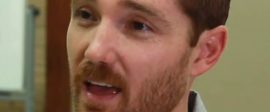FAITH IN HOLLYWOOD: An Interview (Part I) with Ralph Winter and Scott Derrickson
Blog / Produced by The High Calling
A Conversation in Two Acts
The Cast—All as Themselves
Ralph Winter, producer, whose credits include The X-Men trilogy, Planet of the Apes, Star Trek IV: The Undiscovered Country, Inspector Gadget, and Left Behind. He is currently filming Fantastic Four: Rise of the Silver Surfer.
Scott Derrickson, director and writer, best known for The Exorcism of Emily Rose. His credits also include Urban Legends: Final Cut and Hellraiser: Inferno. His current project, Paradise Lost, is in pre-production.
Scott Young, moderator, co-founder of the Coalition for Ministry in Daily Life (CMDL), and co-founder/director emeritus of the City of Angels Film Festival. He is adjunct instructor at Fuller Theological Seminary, the Art Center College of Design, the Los Angeles Film Study Center, and Biola University.
ACT I
The Scene: At Fuller Seminary in Los Angeles, Scott Young leads a special two-person panel discussion for the Coalition for Ministry in Daily Life. Years ago, Fuller began to train its future ministers in media through Reel Spirituality—academics and research into the relationship between theology and film. Both Winter and Derrickson are intimately involved in Reel Spirituality.
Young: Our theme tonight is serving God in the film industry. I would like first Scott and then Ralph to tell their stories. How did they become filmmakers? What projects have they worked on, and what’s ahead?
Derrickson: I became a Christian in junior high and shortly thereafter joined a strict fundamentalist church, and I mean strict. I’m a recovering fundamentalist. That was an intense time in my life, and though I’ve grown and changed in profound ways, I had an encounter with God that has not left me.
I attended Biola, the only Christian college with a film program. Later, at USC film school, I realized I wanted to be a writer and a director inside the studio system, though I could not foresee whether I would find a place for my faith there.
About that time, C. S. Lewis’s The Screwtape Letters was getting passed around film school and read by a lot of my peers, so I reread it. At that time, I also read a novel called Lancelot by Walker Percy. Through a character, Percy said that evil was the great clue to the age. He said God may be dead, but what if someone should find the devil? It was just a character quote, but I had an epiphany. I thought something about scary films, with their deep grappling with good and evil, I thought that was a place where, as a Christian, I could tell stories that mattered to me. My thesis film was homage to The Screwtape Letters. It involved a drive-by gas station shooting and two demons—a strange little movie with lots of Led Zeppelin music.
That got me an agent, and I got into the business. Since then, I’ve written 14 studio screenplays. My first real break was working with Bryan Singer, who saw my short film and wanted to work with me. I directed a small direct-to-video movie called Hellraiser: Inferno, a sequel. I found a way to do it so that it could speak personally to me, and since then I’ve branched into more interesting material. In fall 2005, a film that I wrote and directed called the Exorcism of Emily Rose did quite well at the theaters.
Winter: I was hanging out around the University of Antwerp in a DVD store and saw Hellraiser V.
Derrickson: In Belgium?
Winter: Yes.
Derrickson: I’m big in Belgium.
(Audience Laughter)
Moderator: Ralph Winter, tell us your journey into Hollywood.
Winter: My story is kind of boring. I grew up not far from here and went to UC Berkeley. I was a history major and just kind of fell into the movie business: right time, right place. Out of UC Berkeley, I got a job at Broadway department stores making corporate videos to teach employees how to ring the register and take inventory and greet customers.
Derrickson: That’s scary.
Winter: Yeah, that’s terrifying. I actually wanted to go to Fuller or graduate school, but I found myself at a dead end at the Broadway and someone in personnel said, “My husband works at Paramount. You ought to go over and interview.” I’d never shot any film, but they hired me. I worked there for about three and half years in post production until I eventually escaped to work on the Star Trek movies—did five of those and a lot of other silly movies. Lately, I finished with the third X-Men movie; we just finished Fantastic Four summer 2005, and we’ll be doing a second one summer 2006.
Moderator: Talk to us about some of your major influences, filmmakers, films that inspire and form the way you do your work.
Derrickson: When I was growing up, my family saw a ridiculous number of movies. The drive-in was usually for the R-rated movies, so when the off-limits parts came up, my dad censored the films by making us kids get down behind the seat. The filmmaker in me was born crouching behind the back seat and imagining what was on the screen.
The biggest cinema influence on me was my discovery of Japanese cinema, particularly director Akira Kurosawa. No director in the history of cinema ever had a greater body of work; his films are both art and entertainment, and he always dealt with great human ideas. Those are the kinds of films I wanted to make: movies that people are going to see but at the same time have something to say.
Winter: Harve Bennett took a chance on me. He wrote and produced the Six Million Dollar Man television series and had come to Paramount to work on the Star Trek movies. From him I learned the importance of story and a movie’s power to affect people. He was great, and he is still a great friend and mentor.
Moderator: So any thoughts about how you perform your work that directly connects to the idea of serving God in Hollywood?
Derrickson: No.
(Audience laughter)
Moderator: Well, how about the devil?
Derrickson: That’s actually an important question to me—how my work connects to my Christian service. I spent a good number of years trying to answer what it means to serve God as an artist, as a creative person, then also as a person in the Hollywood studio system, as a screenwriter, and as a director. One school of thought says Christians ought to avoid such things. For other people, it’s no issue at all, and I worked through many of the perspectives out there. Am I supposed to make Christian films? Am I supposed to make movies with good messages that will affect the culture? Is it about somehow participating in evangelism? Then, from the perspective of a Christian in the film industry, everything changed when I got my first paycheck because then I knew it was all about money. (audience laughter) Seriously.
I am an employee, and I have a boss. I have a moral responsibility. As a Christian, particularly as a Christian, I am responsible to service my employer well. I have thought a lot about the integration of Christianity and culture, but what came home to me as a professional was that I have to do my job well, I mean really well. It’s difficult to be a writer or director or producer in Hollywood, period. Inevitably, I am outspoken about my faith; part of that rebellious ex-fundamentalist in me abhors hiding who I am, or anything that feels repressive.
I began to realize that if I put myself out there in a community like Hollywood and identify myself as a Christian, I better be good at what I do. That’s been my biggest burden and the primary answer to that question. If your faith is real, if it’s part of who you are, it will find its way into what you do. You almost don’t have to try to integrate it. In fact, I have to work not to let it out too much. I feel fulfilled as a Christian in those moments when the people—studio heads or producers, or directors that I admire—find out I’m a Christian and admire my work—and I know I have redefined something for them. That’s satisfying for me; and after that, it’s just about taking satisfaction in producing something that’s good.
Winter: I echo Scott. It is about excellence. It’s also about how I do the job to get to the end result. How I treat people—how I fire them, hire them, deal with them—reflects on God in my life. Hollywood has so many flakes in it. A job done with excellence right away makes you stand out. The employers, the executives, the studios, the distributors, the financiers, they know and can figure out pretty quickly who’s got the goods. Christians are held to a higher standard of excellent work, but we also have to work with integrity. It matters how we get there. I don’t wear my Christianity on my sleeve. No Bible on my desk; I don’t try to proselytize. I’m not out to win Hollywood. I’m not out to change Hollywood. I am out to make the best movies I can make, and hopefully some of those movies and stories will stimulate discussion and issues about what is important, what life is about.
Moderator: So if you had $200 million and you didn’t have anything in your way, what film or films would you like to make? No holds barred, what would you like to do?
Winter: I’m attracted to the biblical epics, and maybe not because I’m a Christian. I really enjoyed Ben-Hur—a terrific biblical spectacle. I’ve always wanted to do the book of Esther, which bridges the Christian and Hebrew worlds and has a woman in power. I think that would speak today. Now, unfortunately, TBN has a movie coming out in October 2006 called One Night with the King.
Derrickson: I like genre films, science fiction, thrillers, fantasy, horror films, and these kind of popular pictures. I just signed a deal with a company called Legendary that did Batman Begins and Bryan Singer’s recent movie, Superman, and Warner Brothers, to do $110 million version of Paradise Lost. They’re going to do Milton on the big screen. I got into filmmaking to do something that grand and imaginative, and Paradise Lost has never been done before. Other than that, I want to see more progress in the science fiction genre, specifically its spiritual potential. The best science fiction books I’ve read in the last decade were all religious in nature.
I read the script for a book called The Sparrow by Mary Doria Russell. Remember that title. The script is brilliant and will change how we think about science fiction movies. As a director, I’m attached to a book series called Hyperion. Science fiction has always been about the fear of technology in the 20th century, but fear of technology no longer fills our collective unconscious. The genre is evolving into imagination and wonder about the new physics: string theory, multi-dimensions, time and time travel—which quickly, and inevitably, become theological stories. Cinema is moving that direction, and I hope I can be a part of that.







